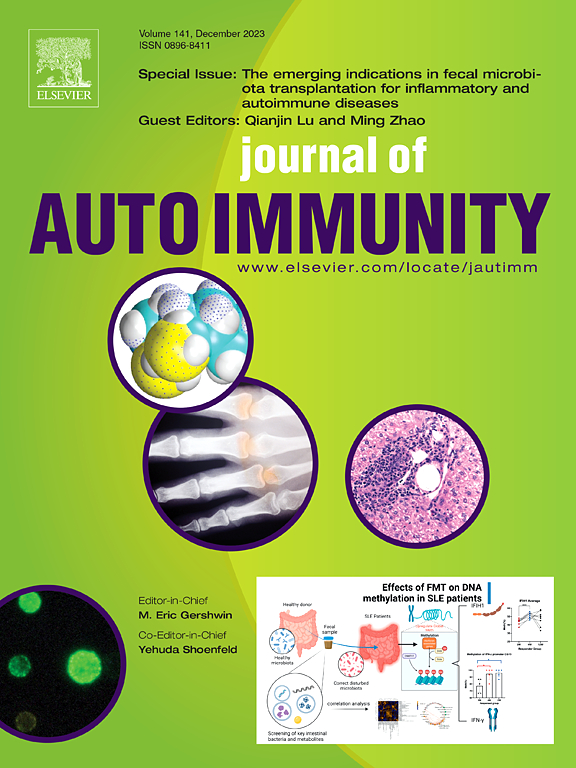系统性红斑狼疮患者对核抗原反应的先天性免疫训练。
IF 7
1区 医学
Q1 IMMUNOLOGY
引用次数: 0
摘要
系统性红斑狼疮(SLE)是一种针对核抗原的自身免疫性疾病,包括来自凋亡微颗粒(MPs)和中性粒细胞胞外捕获物(NETs)的核抗原。在此,我们研究了核自身抗原能否诱导系统性红斑狼疮患者产生训练免疫。训练免疫是一种由初始刺激引起的事实上的先天性免疫记忆,可诱导对后续刺激产生更强烈的长期炎症反应。用系统性红斑狼疮典型核抗原、中性粒细胞胞外捕获物(NET)和凋亡微颗粒(MP)或系统性红斑狼疮患者的血浆刺激分离的单核细胞。休息五天后,用Toll样受体(TLR)激动剂重新刺激细胞,并用酶联免疫吸附法测定细胞因子的产生。通过体外刺激、流式细胞分析、RNA 测序和组蛋白 3 赖氨酸 4 三甲基化染色质免疫沉淀(ChIP)测序,评估了系统性红斑狼疮患者单核细胞的功能、转录组和表观遗传学变化。我们发现,在体外,MPs 和 NETs 以及系统性红斑狼疮患者的血浆都能诱导训练有素的免疫。此外,系统性红斑狼疮患者的循环单核细胞在受到 TLR 配体刺激后会产生更多的促炎细胞因子,这表明患者具有训练有素的免疫力。与此同时,组蛋白 3 赖氨酸 4 三甲基化发生失调,新陈代谢和炎症相关基因的表达增加。我们的研究结果表明,针对核抗原可产生训练有素的免疫力,而训练有素的免疫力与系统性红斑狼疮患者的免疫失调有关。本文章由计算机程序翻译,如有差异,请以英文原文为准。
Trained innate immunity in response to nuclear antigens in systemic lupus erythematosus
Systemic lupus erythematosus (SLE) is an autoimmune disease directed against nuclear antigens, including those derived from apoptotic microparticles (MPs) and neutrophil extracellular traps (NETs). Here we investigated whether nuclear autoantigens can induce trained immunity in SLE patients. Trained immunity is a de facto innate immune memory elicited by an initial stimulus that induces a more vigorous long-term inflammatory response to subsequent stimuli. Isolated monocytes were stimulated with SLE-typical nuclear antigens, neutrophil extracellular traps (NETs), and apoptotic microparticles (MPs) or plasma from SLE patients. After five days of rest, cells were restimulated with Toll-like receptor (TLR) agonists, and cytokine production was measured using ELISA. Functional, transcriptomic and epigenetic changes in monocytes from SLE patients were evaluated by ex vivo stimulations, flow cytometric analysis, RNA sequencing, and chromatin immunoprecipitation (ChIP) sequencing for histone 3 lysine 4 trimethylation. We found that in vitro, both MPs and NETs, as well as plasma from SLE patients, can induce trained immunity. Furthermore, circulating monocytes from SLE patients produce increased levels of pro-inflammatory cytokines after stimulation with TLR ligands, indicating trained immunity. This is accompanied by deregulation in histone 3 lysine 4 trimethylation and increased expression of metabolism and inflammation-related genes. Our findings demonstrate that trained immunity can develop against nuclear antigens and that trained immunity is involved in the immunological dysregulation in SLE patients.
求助全文
通过发布文献求助,成功后即可免费获取论文全文。
去求助
来源期刊

Journal of autoimmunity
医学-免疫学
CiteScore
27.90
自引率
1.60%
发文量
117
审稿时长
17 days
期刊介绍:
The Journal of Autoimmunity serves as the primary publication for research on various facets of autoimmunity. These include topics such as the mechanism of self-recognition, regulation of autoimmune responses, experimental autoimmune diseases, diagnostic tests for autoantibodies, as well as the epidemiology, pathophysiology, and treatment of autoimmune diseases. While the journal covers a wide range of subjects, it emphasizes papers exploring the genetic, molecular biology, and cellular aspects of the field.
The Journal of Translational Autoimmunity, on the other hand, is a subsidiary journal of the Journal of Autoimmunity. It focuses specifically on translating scientific discoveries in autoimmunity into clinical applications and practical solutions. By highlighting research that bridges the gap between basic science and clinical practice, the Journal of Translational Autoimmunity aims to advance the understanding and treatment of autoimmune diseases.
 求助内容:
求助内容: 应助结果提醒方式:
应助结果提醒方式:


